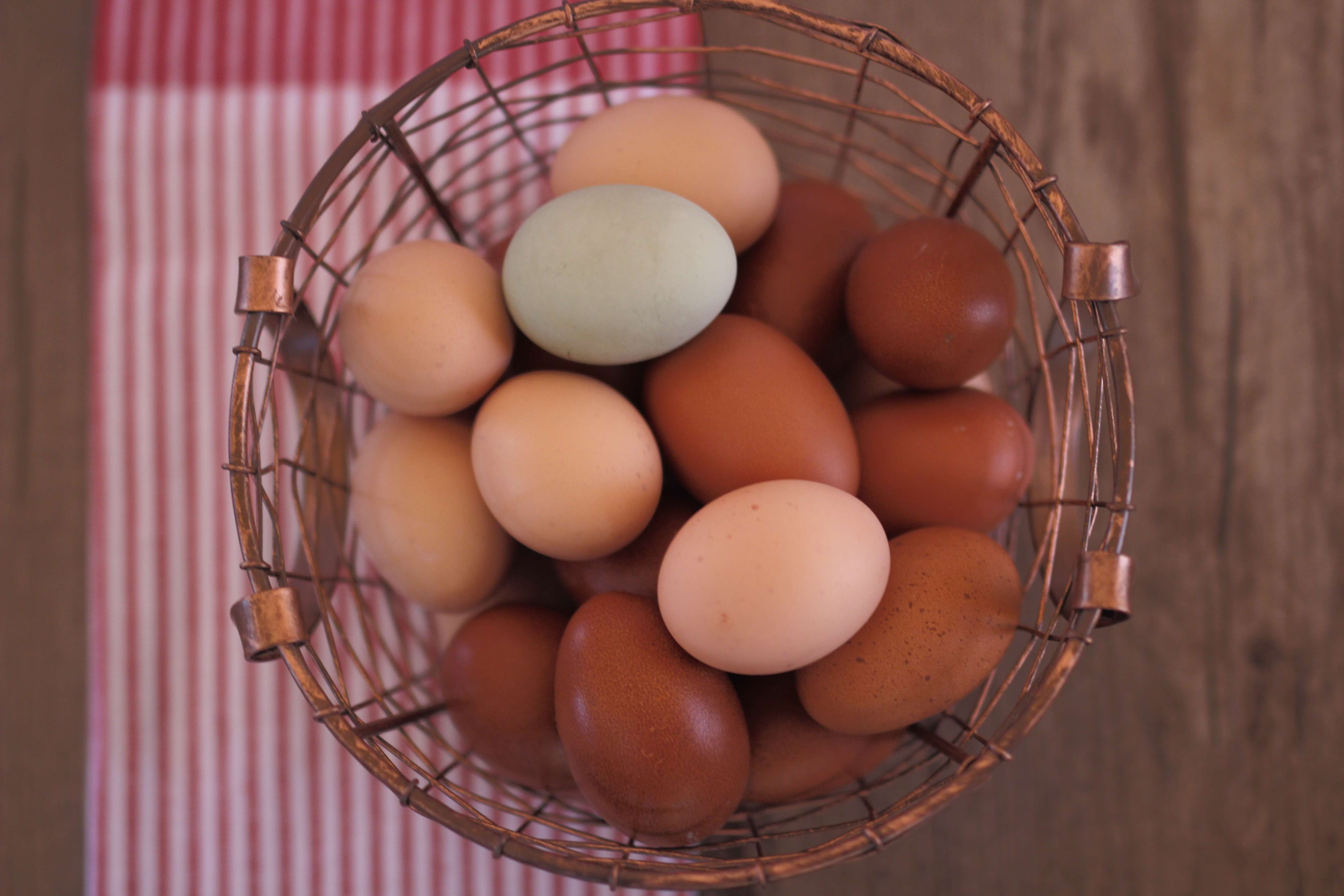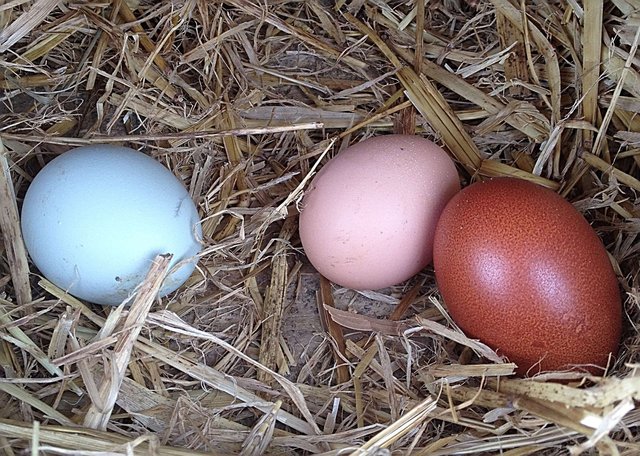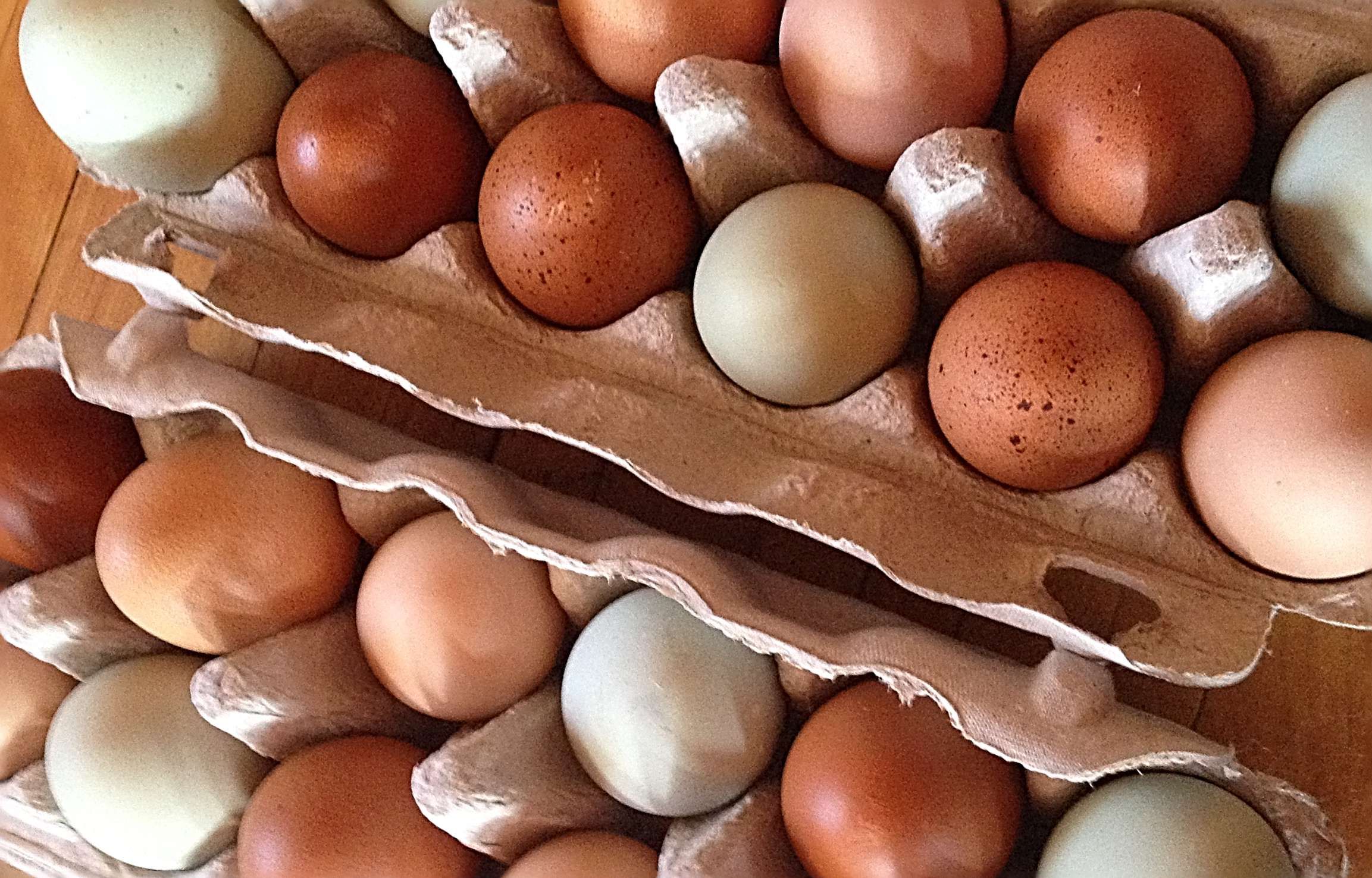8+ Ways To Preserve & Store Eggs
The best part of keeping hens is collecting all of those beautiful eggs! Unfortunately egg delivery can be quite inconsistent and seasonal. The first time I had to go and buy eggs in the winter was embarrassing. I had been giving away eggs all summer to our neighbours and had none stored for winter use. We soon learned to take advantage of periods of abundance by setting aside and preserving eggs to see us through the leaner times.

There are many timeless methods for preserving eggs that are just as effective today as they were a hundred years ago. There are also modern methods that work great too. Most methods for preserving eggs are quite simple and it's well worth the effort!
Fresh eggs are better than store bought. There are no two ways about it. They taste better, cook better, hold more nutritional value and the convenience is unbeatable.
The biggest benefit of eating your own farm fresh eggs is quality control. You choose what your hens eat, what medication they are given, and how they are raised. I heard something recently that really struck a chord. "You are what you eat, but you are what you eat, eats too". Other advantages that you will get from farm fresh eggs include;
The convenience of farm fresh eggs on demand or/ supporting local farmers.
A unique and delightful rainbow of coloured shells from chocolat brown to green (depending on the breed of chicken).
Higher in beta carotene and omega 3 fatty acids.
Lower in cholesterol & saturated fats and higher in vitamins A,D & E.
Washing & Storing Fresh Eggs
You do not need to refrigerate your fresh unwashed eggs, they keep just as well outside of the fridge. When I was a child, visiting relatives in England, I always noticed they would store their eggs on the counter. I always found these baskets of eggs so pretty but didn’t understand why they did this. Shouldn’t they be in the fridge? The difference between how we store our eggs in North America in comparison to other countries, comes down to how commercial eggs are handled.

Eggshells have what’s called a bloom. It’s a natural coating that protects the egg from bacteria & microbes. In some countries the eggs are not washed and this bloom is kept intact. It is not uncommon to have a little fleck of dirt here or there on your eggs. Across the pond in North America the eggs are washed in a solution that removes this protective coating. This means they must be refrigerated and ideally, stored in their original container.
If you do not wish to refrigerate your eggs simply avoid washing them until you use them. If the eggs have a little dirt on them, you can wipe it off with a damp cloth. A really dirty egg can be washed and scrubbed with a vegetable brush but it should be refrigerated or used soon after. Always use warm water and never use cold as this can help draw in bacteria.
Your eggs should stay fresh for about 6 weeks at room temperature. You can extend this by storing them in a cool dark location.
Why are Free Range and Commercial Eggs So Different?
Free range chickens tend to be fed a wider variety of foods. They get vegetables from the garden and when they are outside they are foraging and eating wild flowers & bugs. It’s fascinating to watch a chicken track a bug and catch it. This natural and diverse diet contributes to the flavor and enhanced nutrition in your farm fresh eggs. Diet is also why some yolks are a brighter yellow than others.

Long Term Egg Storage
Chickens don't lay eggs every day. In fact it can be a lot like feast or famine when it comes to eggs. There’s a few reasons for this. First, chickens go through a moulting period each year where they get awfully ugly for a while, shed their feathers and grow back new ones.
This is a great process for their health and hygiene but growing feathers takes a lot of energy and so they stop laying for a while and focus instead on making themselves feathered and beautiful again. Then there’s winter. If you raise hens naturally without supplementary light or heat in winter there will also be a period of time where they stop laying eggs.
Fortunately there are a number of ways to store your excess eggs so that you have plenty during the leaner times.
Refrigeration
Can you imagine life before the convenience of refrigeration? It is one convenience that I would hate to give up.
Fresh eggs can be refrigerated for six months or longer. Place them in egg cartons, pointy end down, for lengthy storage.
Freezing Whole Eggs
Beat eggs just until blended, pour into ice cube trays to freeze and then move them into freezer bags for long term storage.
Freezing Egg Whites
For versatility with baking it can be really handy to separate the white from the yolk. For convenience you can freeze the whites in ice cube trays. Once frozen, you can move them to freezer bags and keep frozen until you want to use them. Once defrosted you can use in baking just as you would have used fresh.
Freezing Egg Yolks
To freeze egg yolks pour the yolks into a bowl and beat in 1/8th tsp of salt (for savoury recipes) or sugar (for sweet recipes) for every four yolks. Pour them into ice cube trays to freeze. Once frozen, you can move them to freezer bags and keep frozen until you want to use them. Once defrosted you can use in baking & cooking just as you would have used fresh.
A couple of egg white cubes and one egg yolk cube is equivalent to one fresh egg.
Salt Storage
Storing fresh eggs in salt can be very effective in keeping them fresh for about a year. You need a lot of salt for this method: a thick bottom layer of salt, a layer of eggs,then completely cover the eggs with salt, add another layer of eggs and repeat. Store your container in a cool dark location.
Dehydrated Eggs
Dehydrated eggs are a portable and convenient way to store eggs long term. They are simply to rehydrate.
Whisk the eggs as though you are making scrambled eggs
Pour the egg mixture onto a fruit leather dehydrator sheet
Dehydrate at 145 degrees until they're dry and brittle
Grind the dried eggs into a powder and store in a plastic container.
Store them in glass jars or plastic containers
Note: You can also cook your eggs before dehydrating. To rehydrate the eggs use a ration of 1:1 water to powdered eggs.
Pickled Eggs
If you enjoy pickled eggs, it is really easy to make your own at home. Hard boil the eggs, give them an ice bath and then peel them. Make a brine of vinegar and your choice of salt, spices and seasoning. Fill a sterilized jar with your eggs, bring your brine to a boil and let it simmer for five minutes.
Pour the hot brine into your jars to cover the eggs. Place the lid on your jars and let them cool. Once cooled, store in a cool dark place, preferably a refrigerator. They should keep for six months or longer.
Cured Yolks
Using salt and sugar you can cure egg yolks. If you haven't tasted cured egg yolks it's really worth trying, they are delicious.
Make salt beds on a baking sheet using equal amounts of sugar and salt blended together.
Carefully place the yolks in the salt beds and cover them with more salt/sugar.
Cover the tray in plastic wrap and refrigerate for one week. Shake off excess salt and gently rinse and pat the yolks dry.
Bake in the oven at 200 for 30-40 minutes.
Grate over salad or pasta. They will keep for several weeks in the refrigerator.
Waterglass
Before refrigeration, eggs would be stored in an earthenware crock using a solution of waterglass. Waterglass is a solution of sodium silicate and water. It prevents oxygen and moisture from reaching the egg and inhibits bacterial growth.
To use this method you will want fresh, clean, unwashed eggs. Inspect them carefully for hairline cracks. Very gently place the eggs in the crock and cover with a solution of one part sodium silicate to ten parts water. The eggs should be completely submerged. Stored in a cool dark place the eggs should last six months. Before using, smell each egg as you crack the shell just in case any have gone bad.
You can fit roughly fifty dozen (600) eggs in a one gallon bucket!
Hydrated Lime (Slaked Lime)
Using the same directions of the waterglass method you can store eggs in a solution of hydrated lime. Use a ratio of one gallon of water to one pound of hydrated lime (scale it up or down accordingly). Hydrated lime is a natural product, mined from limestone, burned, then rehydrated. You can find it at most hardware stores. Be careful to select the right product.
Side note: You can also use hydrated lime to make an all natural white wash for your chicken coop!
Egg Freshness Test
Sometimes its hard to know if those eggs you've got on the counter or in the back of the refrigerator are still good to eat. The easiest way to find out is by using the age old and simple egg freshness water test. It's simple and it really works!
.jpg)
This is a simple test and it works because as the egg ages the air space at the large end of the egg increases. The more buoyancy, the older the egg. Simply place your eggs in a bowl of water.
A fresh egg will sink to the bottom and rest on its side.
An old egg will float right to the top. When an egg is a few days old one end will tip upward at a slant
As the egg gets older it will start to float to the top.
Eggs that float to the surface are very old and could be spoiled although usually they are still fine to eat. The only way to determine if it is truly spoiled or not is to crack it open and check. Signs of a bad egg are obvious. If it has a strong smell or if the white has taken on a blue-green colour, toss it out.
Disclaimer I offer this chapter as a FREE PDF download on my personal blog Walkerland to new subscribers as a thank you for signing up. It's a chapter from my self published ebook "The Homesteader's Handbook: Raising Chickens". I will be making a special steemit mention letting readers know that they can find this guide, no sign up required, exclusively on steemit.
Building a greener, more beautiful world one seed at a time.
Homesteading | Gardening | Frugal Living | Preserving Food| From Scratch Cooking|
You can also find me at: walkerland.ca
Photo copyright: @walkerland

When we were raising chickens and some days gathering over six dozens eggs we had to purchase an old countertop with sink hole. We were washing the eggs out in the corn crib because if not the ENTIRE double sink in the kitchen would have been a heap of eggs!
You have been chosen for this week's steemian embracing by @goldendawne and thanks to @fulltimegeek's delegation as a Steward of Gondor. Please accept this 100% Upvote for this post. You will receive a 100% Upvote for one post every day you make for seven days. CONGRATULATIONS on being a committed steemian!
oh my! That is a lot of eggs. Holy smokes ...that's a lot of chickens too!!
lol- yeah once we had over 200 eggs in the incubator! We lost 7 of them. My son was chicken CRAZY when he was about 14... he actually received a grant from the USDA to start his flock.
At any given time, we had about 10 dozen chickens in the two coops.
He also raised some ducks and pheasants periodically.
That's really very cool! Not only was your some chicken crazy but he was obviously also very responsible and hard working. That is not an easy task and I don't know of too many 14 year old who would have done it. Bet it taught him a lot about work and life.
Yeah I know. He's 31 now and has a calf raising business. Works with six farmers in the area and he's doing GREAT!
We'll done on being a proud mama. I like to think we get some credit for how they turn out :)
A very useful post
I love eating eggs! Although I usually finish eating most and no need to preserve, only refrigeration I guess. I tried making salted eggs too. I wish I could take care of hens that lay eggs though.
Eggs are pretty awesome :)
Indeed!
This is great information. Some of this information is really cool. Thanks for sharing.
Thanks!
Great information on preserving eggs. My problem is I never have enough left over to worry about.
I am always struggling with a shortage, I guess you and I need MORE chickens :)
Definitely!
You are killing it here on Steemit @walkerland! This is also exceptionally useful for me, bookmarked for when I finally start raising chickens. I probably have way too many "future homestead" posts bookmarked now ;)
Thanks for the nice feedback :) I still find this info particularly useful (and I do many of the items listed) because we don't give our chickens any supplementary heat/light in the winter so there's a good number of months when they aren't laying.
I also have more articles and posts bookmarks that I can possibly ever read. There's just so much to experience and learn!! Isn't it wonderful?
It is! And I find it good to not stress about HAVING to read them all. Sometimes saving is enough.
This is great information. Thank you. I learned a lot of things I did not know about how to store and clean eggs. I look forward to following your posts.
Thanks so much for the nice feedback, I appreciate it.
I tend not to store eggs on the side here, because when the heatwaves come and we can't keep the house cooler than 35 degrees I worry we'll have chicks growing!
I remember reading some discussions on blooms and the cuticle. More on the side of hatching eggs though. There are so often arguments between the cleaners and the don't cleans.
I didn't realise eggs could last so long in the fridge. It's great to know they can keep over winter.
Yes, debates on the "do's and don't" with chickens and food preservation can get rather heated, particularly here in North America where people tend to think that "our way" is the only way. I research methods from all continents which I suppose makes me a "rebel". :)
Eggs really do last an insanely long time when stored properly. We still have some in a bucket of slaked lime that are from July. You crack them open and they look and smell as fresh as the day they were laid.
That's pretty amazing. Where would you get slaked lime? I really need to start finding other ways of keeping things that don't involve freezing and refrigeration.
It's funny that the rebel these days seems to be the one that accepts information from both sides and takes the middle path!
It is also sometimes called "pickling lime" and comes in small packets for preserving BUT you can also find it really cheap in big bags at building supply stores.
https://en.wikipedia.org/wiki/Calcium_hydroxide
Thank you, much appreciated.
Such a useful post, I love it! Thanks so much for the information I had no idea fresh eggs could be left out or last so long! I'm interested in getting chickens some day so this is so useful!
Glad you found it useful @pollypocket :)